<> Cheritra freja (Fabricius, 1793) <>
the Common Imperial ผีเสื้อขาวหางริ้ว
Click on any photo to see all photos full size in Lightbox
Additions and corrections to the information provided on this page is always welcome. Please use the Contact form.
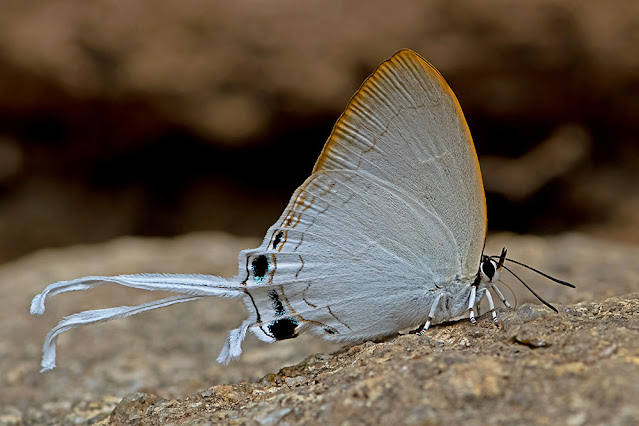
Photo taken at Lamnamkok National Park, Chiang Rai, Thailand. 450m a.s.l.

Cheritra freja is widely distributed across most of the region. In places it is quite common but in other locations it can be relatively rare. The sexes are quite similar in appearance except for the colour of the upper wings, the female being dark brown while the male has an added purple tinge. The undersides, which is the view usually seen, are pretty much identical and so it can be difficult to determine the sex in the field. What makes this species stand out from the crowd is its magnificent tails which are based at the end of vein 2 on the hindwings. These can be up to 25mm in length, are white in colour, and trail elegantly behind the butterfly when in flight. It also has a second pair of tails but these are much shorter and therefore not so impressive.
Both sexes puddle and this is when they are mostly likely to be seen, wings held erect, usually singly and rarely in groups. They bask with wings half open on shrubs and sometimes even in the leaf litter on the forest floor. The species is multivoltine with several generations per annum. The adult female lays her eggs on the underside of young leaves on the host plant. The resulting larvae are polychromatic and can be either pink or green in colour. They feed on the younger leaves of the host plant and are polyphagous, meaning that they feed together in groups.
Synonyms and previously used names: Hesperia freja, Hypolycaena freja, Myrina freja
Taxonomy: Animalia - Arthropoda - Insecta - Lepidoptera - Lycaenidae - Theclinae - Cheritra - freja
Regional subspecies: Cheritra freja evansi (Nepal, Bhutan, NE India, N.Myanmar, N.Thailand, Laos, Cambodia, Vietnam, Yunnan-China), C.freja freja (S.Myanmar, S.Thailand, W.Malaysia), C.freja frigga (W.Malaysia, Singapore, Sumatra-Indonesia), C.freja jafra (Java/Bali-Indonesia), C.freja pallida (E.Malaysia, Borneo-Indonesia, Philippines). There are a couple of further subspecies listed on individual islands in Indonesia.
Regional Distribution: Nepal, Bhutan, India, Bangladesh, Myanmar, Thailand, Laos, Cambodia, Vietnam, China, Malaysia, Singapore, Indonesia, Philippines
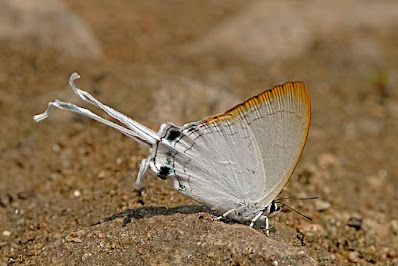 |
| Lamnamkok National Park, Chiang Rai, Thailand 450m a.s.l. |
Habitat: Cheritra freja is found in rainforest, secondary forest, and montane deciduous forest. It is usually seen at forest edges or near streams and sometimes visits urban parks and gardens. It has been recorded up to 1300m a.s.l.
Flight time: all year, depending on location Wingspan: 30-42mm
Life History: egg 2-3 days instar 1 3 days instar 2 2 days instar 3 3 days instar 4 3-4 days instar 5 3 days pupa 6-8 days Total egg to adult 21-26 days
All times are approximate and can vary depending on the season and on the host used.
Larval Hosts: Mangifera indica (Anacardiaceae), Lepisanthes tetraphylla, Litchi chinensis, Mischocarpus sundaicus (Sapindaceae), Adenanthera pavonina, Adinobotrys atropurpureus, Derris elliptica, Entada rheedei, Saraca asoca, Saraca indica, Saraca thaipingensis, Xylia xylocarpa (Fabaceae), Cinnamomum iners, Cinnamomum macrocarpum, Camphora officinarum, Cinnamomum verum (Lauraceae), Duabanga grandiflora (Lythraceae), Monocarpia maingayi, Monoon viride (Annonaceae), Meliosma simplicifolia (Sabiaceae), Nelumbo nucifera (Nelumbonaceae).
Actual host plant used depends upon location and availabilty of plant species.
Adult Food Sources: Nectar - this butterfly is not a regular visitor to flowers but has been observed apparently probing for nectar on the following species, Leucas aspera (Lamiaceae), Ageratum conyzoides (Asteraceae), Helixanthera cylindrica (Loranthaceae), Smilax sp. (Smilacaceae). Other - mud puddling, over-ripe fruit.
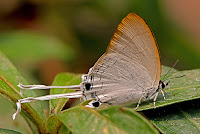 |
| Lamnamkok National Park, Chiang Rai, Thailand |
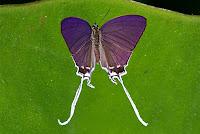 |
| Lamnamkok National Park, Chiang Rai, Thailand ♂ |
 |
| Lamnamkok National Park, Chiang Rai, Thailand |
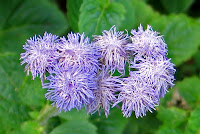 |
| Ageratum conyzoides, a possible nectar source |
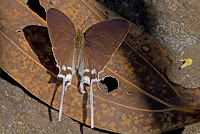 |
| Doi Suthep-Pui National Park, Chiang Mai, Thailand ♀ |
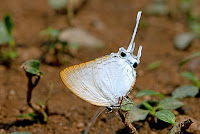 |
| Lamnamkok National Park, Chiang Rai, Thailand |
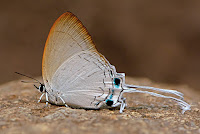 |
| Doi Suthep-Pui National Park, Chiang Mai, Thailand |
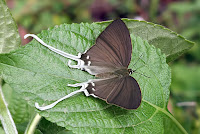 |
| Lamnamkok National Park, Chiang Rai, Thailand ♂ |
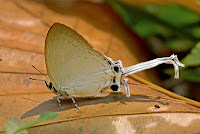 |
| Lamnamkok National Park, Chiang Rai, Thailand |
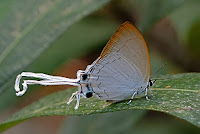 |
| Lamnamkok National Park, Chiang Rai, Thailand |
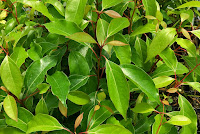 |
| Camphora officinarum, a larval host |
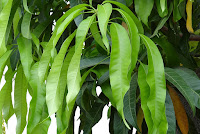 |
| Mangifera indica, another larval host |
Links to other pages in this series for species in the same subfamily
